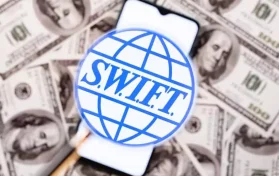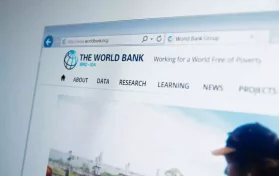
The Russian ruble has lost at least thirty percent of its value since economic sanctions imposed by the West and its allies took effect in the wake of a Russian invasion into Ukraine. The Associated Press is reporting that the ruble’s value fell about thirty percent as a result of the sanctions, and over the weekend into Monday morning, Russian citizens were lined up at ATMs across the country.
Fox News has equated the value of one ruble on Monday morning to approximately that of one penny in U.S. currency.
Late last week, President Joe Biden announced that economic sanctions would include sanctions on Russian banks. At the time, many Americans and Europeans showed support for cutting Russia off from the SWIFT financial messaging system. Over the weekend, as members of the European Union gave their blessing for cutting Russian banks from this transaction intermediary, the White House announced that sanctions would now include restrictions regarding SWIFT.
However, these sanctions still allow for Russia to utilize SWIFT regarding oil or energy transactions, which account for about forty percent of the Russian economy. Russia is the world’s third largest producer of fossil fuels and America imports approximately 200,000 barrels of Russian oil per day, according to 2021 data.
Earlier Monday, the Russian central bank acted quickly to raise interest rates – moving them up to twenty percent – but this rally for the ruble was short-lived.
The U.S. Treasury Department announced just a few hours later that another round of sanctions would “immobilize any assets of the Russian central bank in the United States or held by Americans.” According to the Biden Administration, this could “impact hundreds of billions of dollars of Russian funding.”
Larry Kudlow, former Director of the National Economic Council during the Trump Administration, said that the sanctions are working, but they are effecting the Russian people much more than the Kremlin. Stuart Varney, host of Fox Business television show Varney and Co., said that the sanctions will drive up the price of oil, which will inadvertently help Putin.
The Biden Administration is not alone in imposing further economic sanctions on Russia; German, the United Kingdom, Italy, the European Union, France, and Japan are among countries that are putting the squeeze on the Russian economy.
Unfortunately, the sanctions are having a detrimental effect on the people of Russia, many of whom did not appear to support the Kremlin’s actions in Ukraine. In Russia, individuals over public transportation warned that many citizens might have issues using Apple Pay, Samsung Pay or Google Pay as Russian bank VTB faced sanctions. VTB is the bank that handles card payments for Russian public transportation.
Economists have pointed out that the standard of living for Russians is likely to plunge as a result of economic sanctions by the West. Russia imports many of its goods sold on store shelves, and foreign travel will be much more expensive as the value of the ruble decreases. A professor of economics at William & Mary in Virginia noted, “It’s going to ripple through their economy really fast.”
It is possible that the Russian government could print more rubles in an effort to combat public economic suffering, but, that move could result in hyperinflation later.
The West has also decided to freeze the hard currency reserves of Russia, which could be the knockout punch that topples the Russian economy. European officials believe that at least fifty percent of the approximately $640 billion held outside of Russia could be effected by this freeze. At the same time, Russian government spokesman Dmitry Peskov said “Russia has the necessary potential to compensate the damage.”
Meanwhile in the United States, the Dow was down by about 400 points at press time. The Russian stock market was closed on Monday. Economists are predicting that oil prices will skyrocket amid the Russia-Ukraine fighting. Republicans are pressuring President Biden to relax current oil production measures – such as a moratorium on new oil leases by the Department of the Interior – so that America can produce oil and sell it to our allies in Europe, which would take Russia out of the energy equation while assisting our allies.





